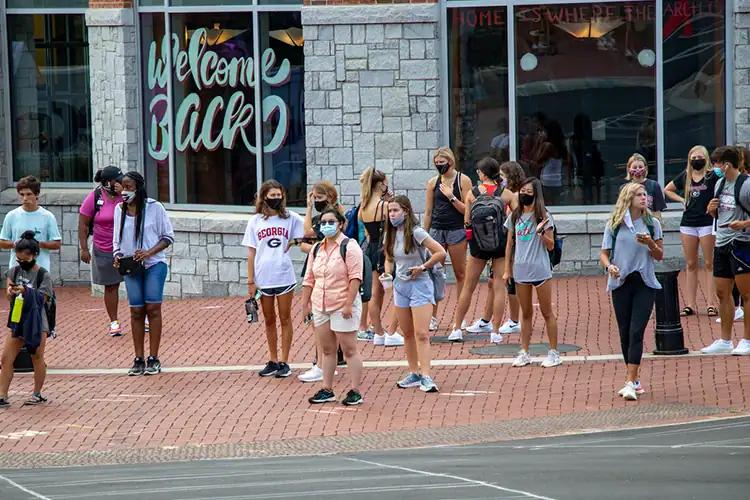10 Best Community Colleges in Georgia
Updated: January 7, 2026

Key Takeaways
- Georgia’s community and technical colleges offer high-quality programs at very affordable prices, usually between $3,000 and $4,000 per year for in-state students.
- You can choose from career-focused training or transfer pathways to top universities through the Technical College System of Georgia and the University System of Georgia.
- Many programs align with the state’s fastest-growing industries like healthcare, film, manufacturing, and tech.
- The HOPE Career Grant can cover 100% of your tuition if you study in one of Georgia’s high-demand fields.
- Small class sizes, modern facilities, and flexible scheduling make these schools great for working adults and career changers.
Why Should You Consider Community Colleges in Georgia?
Looking for a smart and affordable way to start college in Georgia? The state’s community and technical colleges offer flexible, high-value options no matter where you live. Whether you’re in the heart of Atlanta, along the coast, or in a smaller town, you can stay close to home and still get a quality education.
Georgia’s two major public systems, the Technical College System of Georgia (TCSG) and the University System of Georgia (USG), work together to help you meet your goals. You can earn a short-term certificate, complete a two-year associate degree, or transfer seamlessly to a four-year university.
These colleges are closely connected to Georgia’s economy. You’ll find programs in film and TV production, logistics, advanced manufacturing, and healthcare, all designed to meet the state’s workforce needs. Many of these are eligible for the HOPE Career Grant, which can cover your full tuition if you qualify.
Tuition is already affordable, with most in-state students paying between $3,000 and $4,000 per year. Add in small class sizes, one-on-one instructor support, flexible schedules, and online options, and it’s easy to see why Georgia’s community colleges are one of the best values in higher education.

10 Best Community Colleges in Georgia
Georgia is home to a wide range of high-performing community and technical colleges that offer great value and excellent pathways into both the workforce and four-year universities. Whether you’re looking to study in metro Atlanta, a coastal town, or a rural community, these schools combine affordability, program diversity, and strong local partnerships that help you succeed.
West Georgia Technical College
West Georgia Technical College serves west Georgia communities with campuses in Carrollton, LaGrange, Douglasville, and Waco. At just over $2,000 a year, it’s one of the most affordable options in the state.
Main Courses
Advanced manufacturing, healthcare, business, and IT are standout programs, with many offering hands-on training and quick job placement.
Pros
- HOPE Career Grant covers tuition in high-demand fields
- Strong local employer connections
- Multiple campus locations
Cons
- Fewer options for students looking for a traditional academic transfer degree
- Some programs require travel between campuses
Average Annual In-State Tuition: $2,190
Savannah Technical College
Savannah Tech offers career-focused programs across campuses in Savannah, Hinesville, and Effingham County. It’s a top pick for students interested in hospitality or technical careers.
Main Courses
Culinary arts, logistics, aerospace, and historic preservation reflect Savannah’s unique industries and regional job needs.
Pros
- Modern facilities with industry-specific labs
- Close ties to Savannah’s tourism and port sectors
- Strong support for military-affiliated students
Cons
- More limited academic transfer pathways
- Competitive entry for some specialized programs
Average Annual In-State Tuition: $3,040
Georgia State University – Perimeter College
Perimeter College, part of Georgia State University, has five campuses around metro Atlanta. It gives you a low-cost entry point into a respected four-year university system.
Main Courses
Business, engineering, health sciences, and liberal arts all feed directly into GSU’s bachelor’s degree tracks.
Pros
- Guaranteed transfer to Georgia State bachelor’s programs
- Extensive metro Atlanta access
- University-level resources at a lower cost
Cons
- Recent restructuring led to some uneven campus experiences
- High enrollment can make popular classes fill quickly
Average Annual In-State Tuition: $4,740
Wiregrass Georgia Technical College
Wiregrass serves southern Georgia through campuses in Valdosta, Fitzgerald, Douglas, and Sparks. It’s a strong choice if you want to study trades or healthcare in a rural setting.
Main Courses
Specialties include agriculture tech, nursing, automotive repair, and computer support.
Pros
- Excellent regional job placement rates
- Up-to-date labs and tools
- Personalized instruction in smaller classes
Cons
- Limited cultural or entertainment offerings nearby
- May require personal transportation to reach campus
Average Annual In-State Tuition: $4,900
University of North Georgia – Gainesville Campus
The Gainesville campus of UNG gives you a university environment with a community college structure. It’s a good stepping stone to bachelor’s degrees within the University System of Georgia.
Main Courses
Strong in business, education, pre-nursing, and military science, with many students continuing on to full UNG degrees.
Pros
- Smooth transfer into bachelor’s programs
- Beautiful campus setting
- Close to Atlanta suburbs
Cons
- Growing enrollment has led to infrastructure strain
- Limited on-campus housing
Average Annual In-State Tuition: $5,730
Georgia State University
GSU’s Atlanta campus offers a unique blend of community college accessibility and university-level academics right in the heart of the city.
Main Courses
GSU is known for programs in public health, criminal justice, business, and urban studies, with strong ties to Atlanta’s industries.
Pros
- Access to research and university resources
- Strong employer connections in downtown Atlanta
- Broad program selection
Cons
- Higher tuition than traditional community colleges
- Urban location can increase living expenses
Average Annual In-State Tuition: $10,013
Atlanta Technical College
ATC provides hands-on career training in one of Georgia’s fastest-growing cities. Located in southwest Atlanta, it offers direct pathways into the workforce.
Main Courses
Film production, logistics, culinary arts, and healthcare are highlights, supported by industry-standard equipment.
Pros
- HOPE Career Grant reduces tuition for high-demand programs
- Modern labs and real-world training environments
- Strong job placement in metro Atlanta
Cons
- Higher tuition than many technical colleges
- Not focused on academic transfer
Average Annual In-State Tuition: $11,300
South Georgia Technical College
SGTC offers a full campus experience in Americus, complete with dorms and specialized aviation and tech training.
Main Courses
Top programs include aviation maintenance, law enforcement, motorsports, and diesel technology.
Pros
- On-campus housing
- Nationally recognized aviation programs
- Extensive scholarships
Cons
- A rural setting may limit entertainment and job access
- Higher tuition than most Georgia TCSG colleges
Average Annual In-State Tuition: $13,400
Oglethorpe University
Though not a public community college, Oglethorpe offers a liberal arts experience with small class sizes and generous financial aid in Atlanta’s Brookhaven neighborhood.
Main Courses
Strong in business, communications, psychology, and its experiential learning program, the Atlanta Laboratory for Learning.
Pros
- Historic campus and small class sizes
- Substantial merit scholarships
- Unique liberal arts focus
Cons
- Private college tuition is much higher than community options
- Limited program offerings compared to larger schools
Average Annual In-State Tuition: $14,070
Spelman College
Spelman is a prestigious HBCU for women of color, located in Atlanta. While it’s not a community college, it attracts students seeking strong support and standout outcomes.
Main Courses
Offers highly regarded programs in biology, psychology, arts, and African American studies with an emphasis on leadership and service.
Pros
- Powerful alumnae network
- High graduation and grad school placement rates
- Deep cultural and academic support
Cons
- Significantly higher tuition
- Competitive admissions
Average Annual In-State Tuition: $22,300
Tuition and mandatory fee amounts change regularly and can vary by program, course load, credit amount, and delivery format. The figures listed here reflect the latest numbers available and are intended for comparison only. Always confirm the current annual in-state tuition and required fees on the university’s official website before applying.

Key Requirements for Enrolling in the Best Community Colleges in Georgia
Before you enroll at one of Georgia’s community or technical colleges, you’ll need to complete a few important steps. These requirements ensure you’re placed in the right courses and qualify for the lowest possible tuition rates. Georgia keeps its application process simple, and many schools offer support to help you through it.
High School Credential Verification
Most schools require proof of high school completion, such as a diploma, GED, or recognized equivalent. High school students can also get started early through Georgia’s Move On When Ready dual enrollment program.
Georgia Application Submission
You’ll need to submit an application either through the Technical College System of Georgia (TCSG) portal or an individual college’s website. Application fees are usually between $20 and $30, but some schools waive the fee during special events or for qualifying students.
Placement Assessment Completion
To place you in the right classes, many colleges use placement tests like the ACCUPLACER or consider your high school grades. Some schools may also waive testing if you’ve completed certain college-level courses.
Residency Status Documentation
To get the lower in-state tuition rate, you must prove that you’ve lived in Georgia for at least 12 consecutive months before enrolling. Schools usually ask for documents like a lease agreement, a Georgia driver’s license, or utility bills.
Financial Aid Filing
Filing the FAFSA is key to unlocking Georgia’s excellent financial aid programs, including the HOPE Scholarship, Zell Miller Scholarship, and the HOPE Career Grant, which can fully cover tuition for students in high-demand fields.
How Do Georgia Community College Costs Compare to National Averages?
Georgia’s community and technical colleges are among the most affordable in the country. In-state students typically pay between $3,000 and $4,000 per year, which is lower than the national average of around $5,000. That makes Georgia a great place to start your higher education without taking on too much debt.
What makes the deal even better is the HOPE Career Grant. If you choose a high-demand field like healthcare, logistics, or manufacturing, this grant can cover your full tuition. When you add in the savings on housing and transportation by staying local, you’re looking at one of the best values in higher education anywhere in the U.S.
What Are the Tuition Fees for International Students at Community Colleges in Georgia?
If you’re an international student, tuition at Georgia’s community and technical colleges typically ranges from $8,000 to $12,000 per year. While this is higher than in-state rates, it’s still much more affordable than attending a private college or a public university as an international student.
International students won’t qualify for state-specific aid like the HOPE Scholarship, but many colleges offer their own scholarships, diversity grants, or part-time campus jobs to help offset costs. Just be sure to budget for additional expenses like health insurance (usually around $1,500 to $2,000), SEVIS fees, and living costs based on where in Georgia you plan to study.
How Does University of the People Compare with the Best Community Colleges in Georgia?
University of the People (UoPeople) offers a unique alternative to Georgia’s traditional colleges. Instead of charging tuition, UoPeople only charges assessment fees for each course, which makes the total cost for a bachelor’s degree around $6,460.
While Georgia’s community colleges are already affordable, especially with the HOPE Career Grant, UoPeople’s fully online model gives you even more flexibility. You can study on your own schedule, from anywhere in the world, which is ideal if you’re working or caring for family.
UoPeople is accredited by the WASC Senior College and University Commission (WSCUC). Georgia’s colleges are regionally accredited by the Southern Association of Colleges and Schools (SACS), which employers or other universities may more widely recognize. However, if flexibility, affordability, and global access are top priorities for you, UoPeople could be a smart fit.

Ready to Choose the Best Community College?
Choosing the right community or technical college in Georgia starts with understanding your goals. Are you looking to transfer to a four-year university like Georgia State or the University of Georgia? Or are you aiming to land a job quickly through a hands-on technical program? Georgia’s higher education system supports both paths with strong programs, excellent affordability, and statewide support.
You’ll want to compare program offerings, campus locations, and support services. If you’re pursuing a career in high-demand fields like film, logistics, healthcare, or IT, the HOPE Career Grant could cover your entire tuition. Be sure to check what each college specializes in and whether they have articulation agreements for seamless university transfers.
No matter where you are in Georgia, rural towns, coastal cities, or the heart of Atlanta, you’ll find a community college or technical school that meets your needs without overwhelming your finances. Research, reach out, and start mapping out your next step toward a smart, affordable college education.
FAQs
What is the cheapest community college in Georgia?
West Georgia Technical College is one of the most affordable options, with in-state tuition around $2,190 per year. Many other technical colleges also offer low tuition, especially if you qualify for the HOPE Career Grant.
How much does tuition cost at Georgia community colleges?
Most full-time in-state students pay between $3,000 and $4,000 per year. Tuition varies slightly depending on the college and your program, but Georgia remains one of the most affordable states for community and technical college education.
What financial aid is available at Georgia community colleges?
You can apply for the HOPE Scholarship, Zell Miller Scholarship, and HOPE Career Grant. The Career Grant covers full tuition for high-demand programs like nursing, logistics, IT, and more. Federal aid through the FAFSA is also available, along with institutional and local scholarships.
Are Georgia community colleges open to international students?
Yes, most Georgia community colleges accept international students. While you won’t qualify for state-funded aid, you can apply for institutional scholarships and may be eligible for on-campus jobs to help with costs.
Do Georgia community colleges offer online degree programs?
Many Georgia community and technical colleges offer fully online or hybrid programs, especially in business, healthcare, and IT. Availability depends on the specific college and program, so check with the admissions office.
Can I earn a bachelor’s degree at Georgia community colleges?
Community and technical colleges in Georgia do not award bachelor’s degrees, but many have guaranteed transfer pathways to four-year universities within the University System of Georgia, such as Georgia State University and the University of Georgia.
